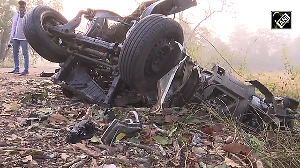Reports indicate that a terrorist needs just about 50 dollars to purchase a GPS jammer, an electronic device small enough to fit in a shirt pocket, which can reportedly bring down an airplane.
According to a report by Fox News, despite being illegal and potentially dangerous, GPS jammers are cheap and readily available online.
With car thieves in the United Kingdom using GPS jammers to aid their getaways, experts say it's only a matter of time until crooks -- and, ominously, terrorists -- in the United States catch on.
Jammers transmit a low-power signal that creates signal noise and fools a GPS receiver into thinking the satellites are not available.
They can be used to confuse police and avoid toll charges, and some pranksters use them to nettle unsuspecting iPhone users.
But the real threat is the unknown.
Criminals could use them to hide their whereabouts from law enforcement-- and some experts fear terrorists could use high-powered jammers to disrupt GPS reception on an airplane or in military operations.
The devices pose serious societal risks, and they are unquestionably illegal to buy and use in the United States.
Yet, they're easily bought online, and their proponents say they should stay that way.
"GPS is so embedded in the transportation, manufacturing industries and economies of our societies that the risk is high," said David Last, an Emeritus Professor of Bangor University in the United Kingdom and a well-known authority on the criminal use of GPS jammers.
"It's especially so in telecommunications: GPS is the ultimate source of timing for most of our telephone systems, the Internet and, in the United States, phone cells," he added.
All those systems are potential prey for jammers, and that's largely why they are illegal.
GPS and cell phone jammers are not exactly state-of-the-art. The devices, which cause signal confusion and disruption, are actually similar to illegal cell phone jammers.
The risk is low for airplanes, which use ground-based radars for guidance and have a back-up navigation system that does not depend on satellites.
Military personnel use a private GPS network. But GPS jamming could nonetheless cause confusion in the cockpit as pilots have to switch to back up navigation systems.
And maritime shipments that rely on GPS coordinates for finding port locations could face problems as well.








 © 2025 Rediff.com -
© 2025 Rediff.com -